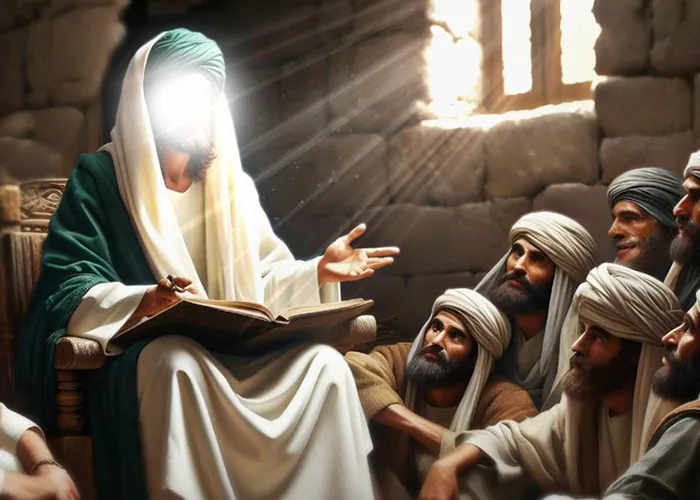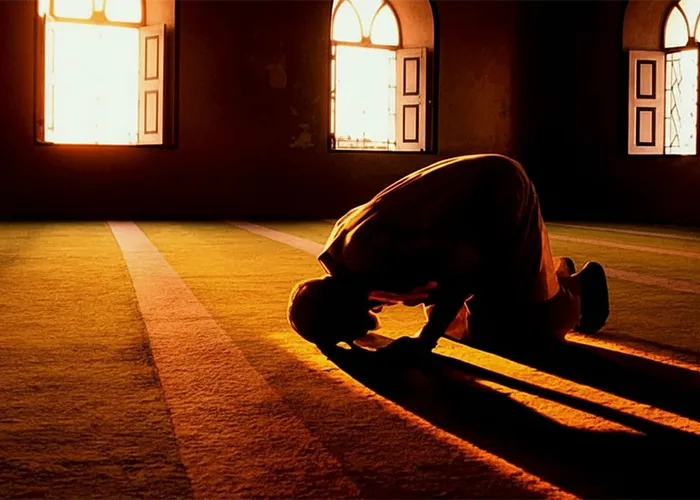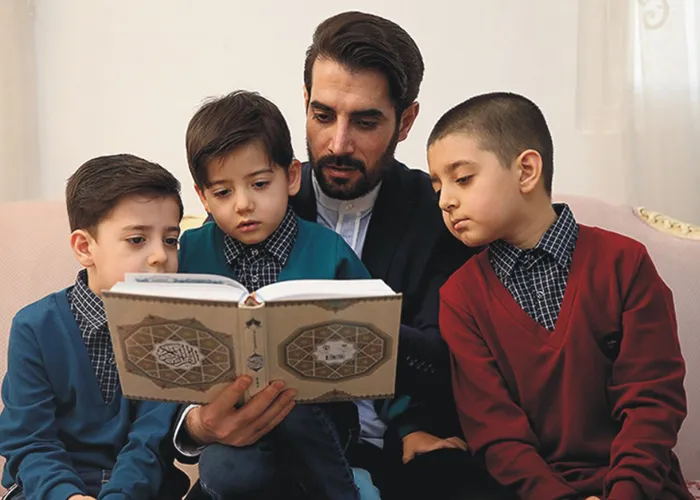Topic of the Week – Volume02 Issue02
The Best Fathers of the Islamic Nation
Seyed Hashem Moosavi
This week, on the occasion of the blessed birth anniversary of the Commander of the Faithful, Imam Ali (peace be upon him), we dedicate our article to highlighting one of his unique virtues as beautifully expressed by the Prophet Muhammad (peace and blessings be upon him and his progeny). This luminous hadith, and especially this invaluable virtue, if truly understood by Muslims, would draw the love of Imam Ali (peace be upon him) into the hearts of earthly beings just as it has captivated the hearts of the heavenly ones. Such love could eliminate the need for the creation of Hell, as conveyed by Gabriel to the Prophet (peace and blessings be upon him and his progeny):
«وَ الَّذِی بَعَثَک بِالْحَقِّ نَبِیاً لَوْ أَنَّ أَهْلَ الْأَرْضِ یحِبُّونَ عَلِیاً کمَا یحِبُّهُ أَهْلُ السَّمَاوَاتِ لَمَا خَلَقَ اللَّهُ نَاراً»
“By the One who sent you as a prophet in truth, if the inhabitants of the earth loved Ali as much as the inhabitants of the heavens do, Allah would never have created the Fire.”
The pinnacle of Imam Ali’s virtues towers so high that one must lift their gaze towards the heavens to see its summit. Moreover, the sheer number of his virtues is so vast that they are beyond enumeration. As the Prophet (peace and blessings be upon him, and his progeny) stated:
«إِنَّ اللَّهَ تَعَالَى جَعَلَ لِأَخِي فَضَائِلَ لَا تُحْصَى كَثْرَةً»
“Indeed, Allah has granted my brother Ali virtues that cannot be counted due to their abundance.”
The poet aptly captures this sentiment:
“The sea’s waters aren’t insufficient to record your merits,
Even if I wet my fingertips and start counting page by page.”
Therefore, no one can compare themselves to Imam Ali. Yet, everyone can strive towards that towering peak and boundless ocean of virtues, shaping their lives in such a way that the values embodied by this great Imam are interwoven into every fabric of their existence.
Introduction
Before delving into the specific virtue we aim to discuss, it is important to first note that Shia Muslims take pride in celebrating the 13th of Rajab each year for two significant reasons:
First: They believe that Imam Ali (peace be upon him) was born on this day in the city of Mecca, inside the sacred Kaaba. This birth, as acknowledged by Ibn Sabbagh Maliki, a Sunni scholar, in his book Fusul al-Muhimmah, is among the most remarkable virtues of Imam Ali (peace be upon him). He states:
«و لم يولد فى البيت الحرام قبله احد سواه و هى فضيلة خصه الله تعالى بها اجلالا له و اعلاء لمرتبته و اظهارا لتكرمته»
“No one before him was born in the House of God except him. This is a virtue that Allah Almighty granted exclusively to Ali, to honor him, elevate his rank, and manifest his distinction.”
Second: They believe that Imam Ali (peace be upon him) is the spiritual father of the Islamic nation. According to Islamic traditions, two categories of fathers are recognized for a human being:
- Those who are the biological source of one’s birth.
- Those who are responsible for one’s spiritual upbringing and moral perfection.
Shia Muslims hold that, as per the declaration of the Noble Prophet Muhammad (peace and blessings be upon him and his progeny), the Commander of the Faithful, Imam Ali (peace be upon him), was entrusted with the spiritual guidance and nurturing of the Islamic nation, making him their spiritual father. Therefore, his birth is celebrated as Father’s Day to honor his unique status.
“The Father of the Islamic Nation”: A Unique Virtue of Imam Ali (Peace Be Upon Him)
Building upon the introduction, we now turn to a profound hadith from the Noble Prophet Muhammad (peace and blessings be upon him and his progeny) that unveils this unparalleled virtue of Imam Ali (peace be upon him) as the “Father of the Islamic Nation.”
Asbagh ibn Nubatah, a close companion of Imam Ali (peace be upon him), narrates:
“In the final days of the Imam’s life, I went to visit my master, Imam Ali (peace be upon him), and requested a hadith from him. The Imam said to me: ‘Sit down, for I do not think you will hear another hadith from me after this. Know, O Asbagh, that during the final days of the Prophet’s (peace and blessings be upon him and his progeny) life, when he was bedridden, I visited him just as you are now visiting me. The Prophet said to me:
‘Go and call the people to gather for prayer. Then, ascend the pulpit, standing one step below my place, and say to the people:
«الا من عقّ والديه فلعنة اللّه عليه، الا من ابق من مواليه فلعنة اللّه عليه، الا من ظلم اجيرا اجرته فلعنة اللّه عليه»
“Beware! Whoever disrespects their parents, may the curse of Allah be upon them. Beware! Whoever abandons their master, may the curse of Allah be upon them. Beware! Whoever oppresses a laborer regarding their wages, may the curse of Allah be upon them.”
“O Asbagh! I carried out the command of my beloved Prophet Muhammad (peace and blessings be upon him and his progeny). While addressing the people, a man from the farthest corner of the mosque stood up and said, ‘O Abu al-Hasan, you have made three concise statements; explain them to us.’ I did not respond to him immediately but instead went to the presence of the Prophet (peace and blessings be upon him and his progeny) and said, ‘A man has asked me to elaborate on what I said.’”
Asbagh continues: “At that moment, Imam Ali (peace be upon him) took my hand and said, ‘Open your hand.’ I opened my hand, and the Imam took hold of one of my fingers and said, ‘O Asbagh, just as I am holding your finger now, the Prophet (peace and blessings be upon him and his progeny) took my finger and said:
«مه يا ابا الحسن، الا و انّي و انت ابوا هذه الامّة، فمن عقّنا فلعنة اللّه عليه، الا و انّي و انت موليا هذه الامّة، فعلى من ابق عنّا لعنة اللّه، الا و انّي و انت اجيرا هذه الامّة، فمن ظلمنا اجرتنا فلعنة اللّه عليه، ثمّ قال آمين، فقلت آمين»
‘Pay no heed, O Abu al-Hasan, and know this: Surely, I and you are the two fathers of this nation. Whoever disrespects us, may Allah’s curse be upon them. Know this: Surely, I and you are the guardians of this nation. Whoever turns away from us, may Allah’s curse be upon them. Know this: Surely, I and you are the workers of this nation. Whoever denies us our rightful due, may Allah’s curse be upon them.’
“The Prophet then said, ‘Ameen,’ and I, too, said, ‘Ameen.’”
Through this profound narration, the Prophet Muhammad (peace and blessings be upon him and his progeny) conveys Allah’s message to the people, emphasizing Imam Ali’s unique title as the “Father of the Islamic Nation.” This title highlights Imam Ali’s nurturing, fatherly role in guiding and safeguarding the Muslim community.
This paternal perspective of Imam Ali (peace be upon him) becomes especially evident in the aftermath of the Saqifah incident. Out of concern for the unity and well-being of the Muslim nation, which he regarded as his children, Imam Ali chose silence and sacrificed his rightful claims to prevent the nation from falling further into division and destruction.
This hadith has been narrated through Lady Fatimah al-Zahra (peace be upon her) and the other Imams (peace be upon them), reaching as far as Imam Hasan al-Askari (peace be upon him). It serves as a testament to Imam Ali’s unparalleled role and his enduring fatherly presence in the spiritual and moral upbringing of the Islamic nation.[1]
Based on the profound message of this hadith, commemorating the birth of Imam Ali (peace be upon him) as the “Father of the Nation” is, in essence, fulfilling Allah’s command to honour the paternal roles of the Prophet Muhammad (peace and blessings be upon him and his progeny) and Imam Ali (peace be upon him). This act of reverence seeks to partially fulfil their immense rights over the Muslim community.
The rights of Imam Ali (peace be upon him) mirror the divine obligations mentioned in the Qur’an regarding Prophet Ibrahim (peace be upon him). The Qur’an describes Prophet Ibrahim as the true spiritual father of the nation, commanding Muslims to follow him and be his loyal adherents (Shia Ibrahim). Similarly, it is incumbent upon the Muslim community to follow their spiritual fathers, namely, the Prophet Muhammad (peace and blessings be upon him and his progeny) and Imam Ali (peace be upon him), while demonstrating both internal and external love[2] and refraining from disobeying their corrective commands.
The virtues of the Commander of the Faithful are so vast and profound that endless discussions and countless books could never do justice to his legacy. Even so, a statement by the Sunni scholar Ibn Abi al-Hadid al-Mu’tazili in the introduction to his commentary on Nahj al-Balagha sheds light on Imam Ali’s unmatched greatness:
“What can I say about a man whose virtues even his enem
ies acknowledged, unable to deny or conceal his greatness? What can I say about a personality whose name was kept hidden by both friends and foes—friends out of fear and oppression, and foes out of envy? Yet, despite this, his character has filled the East and the West with its light and majesty!”
[1] . Uyun Akhbar al-Reza, peace be upon him, Vol. 2, p. 86, Il-Al-Sharia, vol. 1, Allamah Majlisi, Bihar al-Anwar, vol. 23, p. 259 – Beirut, Al-wafa, 1403 AH.
[2] . Surah Shura, verse 23.
editor's pick
news via inbox
Subscribe to the newsletter.




